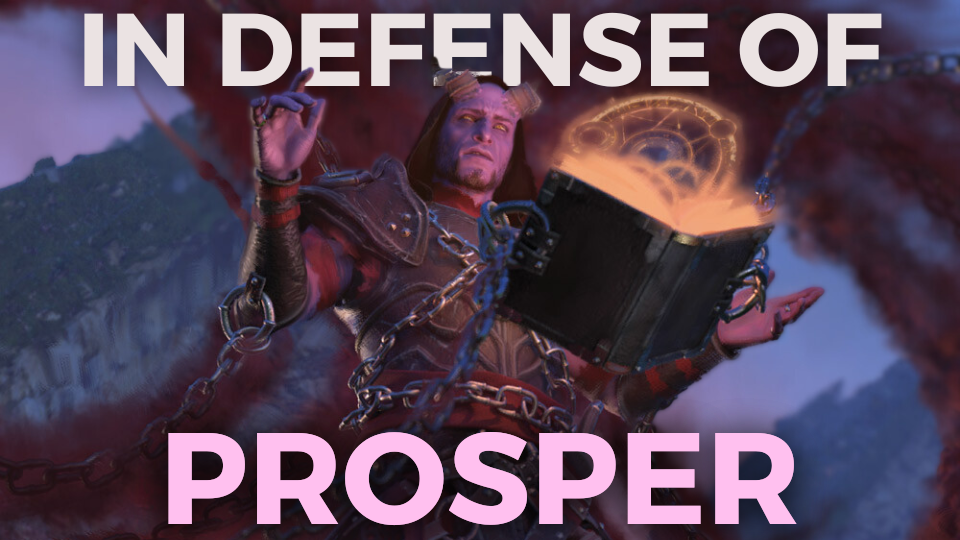In Defense of Prosper, Tome-Bound

Prosper, Tome-Bound by Yongjae Choi
In Magic: The Gathering, there are always cards players love to hate, especially in Commander. There's an endless "discourse" about the subject anywhere players congregate online. However, Magic is an ever-evolving game riddled with subjectivity, and some cards earn a reputation many think they don't deserve. With that in mind, today we're going to defend perhaps the poster boy of "everything wrong" with modern Commander: Prosper, Tome-Bound
Modern Poetry
Before we get into my defense, I'd like to take a seemingly abrupt left turn and talk about Elizabethan poet Phillip Sidney. In the late 16th century, he wrote a piece of literary criticism that stressed the value of poetry in a society that had become apathetic about the historically important art form. I read this work in undergrad, now more than a decade ago, and it's stuck with me all these years.
Sidney's treatise is called The Defense of Poesy (or An Apology for Poetry), and the skillful way he presented his argument is half of what inspired me to take up this mantle of saving maligned cards from widespread disdain.

My Prosper deck is the other half of what inspired this previously attempted series (from when I still worked at Card Kingdom). I built it because I loved playing cards from exile, and Prosper was the only strictly exile-matters Commander at the time.
That was hardly an original feeling, though, considering Prosper exploded with popularity as this heavily supported archetype that had only been missing the right face fell into the community's hands, and not long afterward, almost everyone who built a deck led by this spicy little Tiefling found out exactly what everyone else felt about him.
People hated this guy. With card AND mana advantage stapled onto a deathtouch body in two colors with plenty of ways to spend big mana, the resources Prosper created served as the model for today's value-focused metagame.
Are you doing a thing already? Have something extra as a treat. Then amass such a lead that no one can catch you. After that, shuffle up and do it again.
I can see how that's both tiresome and difficult to play against. It could certainly put Prosper in the "kill on sight" category among other format terrors, and many playgroups have already done so. Still, I think the blanket assumption that Prosper cannot be suffered to live more than a single turn is mistaken.
Pointing Fingers
Since you already let me deviate once from my point for a moment, allow me to do it at least one more time. You see, I have a cherished friend in my usual playgroup. They're all cherished, to be honest (except for you, and you know who you are...), but I want to focus on this one in particular, because, while everyone agreed that Prosper usually had to die whenever I brought my deck to the table, he also owns a two-color Commander deck that brought upon me an epiphany.
You might remember this guy's "O face" from a prolonged period of bullying MULTIPLE 60-card formats. And wouldn't you know it? He makes for an equally incredible Commander! Why might that be the case?
Well, since reading the card explains the card, we can see Uro, Titan of Nature's Wrath
Card advantage. Mana advantage. Deadly body. Can you see the similarities?
So, noticing this kindred nature between Uro and Prosper, I decided to roll my Warlock into a game against Theros' strongest titan, and as usual, it didn't take long for the politicking to turn against my poor boy, but I was quick to point out that Uro was doing the same thing, so they should focus that deck down!
My pleas failed to sway anyone. Prosper got removed, like, four times, Uro snowballed out of control and used a massive Genesis Wave
This rehashing of ancient history is all to set up my core defense of Prosper, which has nothing to do with any claims that he isn't a really scary, powerful card to sit across from. No. Instead, my point is he's so far from the only value-criminal that he doesn't deserve to be singled out as worse than any others.
The Stonk Game
Magic has always been a game about investing an increasing amount of resources into bigger and better plays for the win. Whoever can do that better, faster is often the winner, but while the golden age of Commander was once about using your leftover cards to make janky brews, increased attention from Wizards of the Coast has evolved the format into that efficient, inevitable shape that eventually claims all things (capitalism?).
Not to say that's a bad thing, though! There's a reason we all love Magic, and a lot of it comes down to casting a lot of cool spells that win us the game. What we should remember, then, is that doing that takes mana and cards, so should we really punish certain Commanders for making those dreams happen?
Wizards of the Coast certainly doesn't think so. That's why we've seen cards like Miirym, Isshin, Omnath (the four-color flavor), and many others become some of the most popular commanders. They just let players benefit from doing what they like, a lot. Prosper is the same, not a worse offender.
That said, not everyone wants to fight against the might of Wall Street when they sit down to play Commander, and if they happen to see a Warlock stroll up in his designer... outfit, it might make sense to rally the table against them, but before you assault those Prosper decks like you're living an old Simpsons joke, take a look around the rest of the table. You might find there are equally wretched offenders among you that might be worth targeting (at least after you've collectively removed Prosper for the third time).
That is to say *ahem*... please let me untap with Prosper. I promise not to cast Torment of Hailfire
Oh yeah, and here's my Prosper deck!
Jason Krell's Prosper, Tome-Bound
View on ArchidektCommander (1)
Lands (36)
- 1 Blightstep Pathway // Searstep Pathway
- 1 Blood Crypt
- 1 Bojuka Bog
- 1 Cabal Coffers
- 1 Castle Locthwain
- 1 Command Tower
- 1 Dragonskull Summit
- 1 Exotic Orchard
- 1 Luxury Suite
- 10 Mountain
- 1 Rakdos Carnarium
- 1 Reliquary Tower
- 1 Spinerock Knoll
- 10 Swamp
- 1 Temple of Malice
- 1 Treasure Vault
- 1 Urborg, Tomb of Yawgmoth
- 1 War Room
Creatures (31)
- 1 Birgi, God of Storytelling // Harnfel, Horn of Bounty
- 1 Brainstealer Dragon
- 1 Dauthi Voidwalker
- 1 Decadent Dragon // Expensive Taste
- 1 Dire Fleet Daredevil
- 1 Disciple of the Vault
- 1 Dockside Extortionist
- 1 Draugr Necromancer
- 1 Dream Devourer
- 1 Etali, Primal Storm
- 1 Glóin, Dwarf Emissary
- 1 Goldspan Dragon
- 1 Grim Hireling
- 1 Keeper of Secrets
- 1 Laelia, the Blade Reforged
- 1 Laughing Jasper Flint
- 1 Lobelia Sackville-Baggins
- 1 Magmatic Channeler
- 1 Marionette Master
- 1 Mastermind Plum
- 1 Mirkwood Bats
- 1 Murderous Rider // Swift End
- 1 Professional Face-Breaker
- 1 Reckless Fireweaver
- 1 Robber of the Rich
- 1 Ruthless Technomancer
- 1 Tectonic Giant
- 1 Urabrask, Heretic Praetor
- 1 Valki, God of Lies // Tibalt, Cosmic Impostor
- 1 Wild-Magic Sorcerer
- 1 Xorn
Artifacts (8)
Instants (6)
Sorceries (10)
Planeswalkers (1)
Enchantments (7)